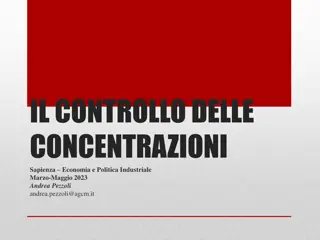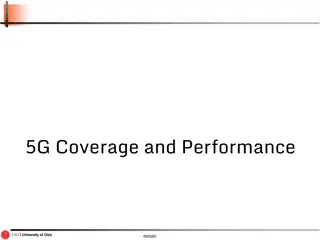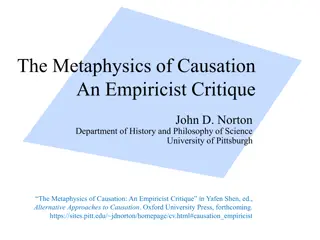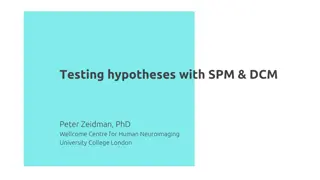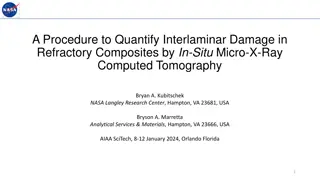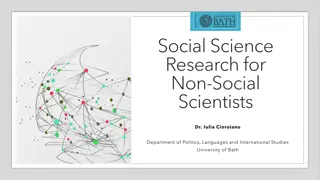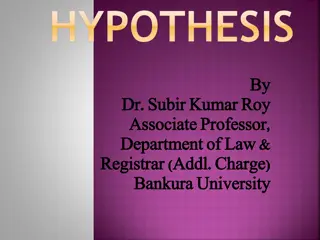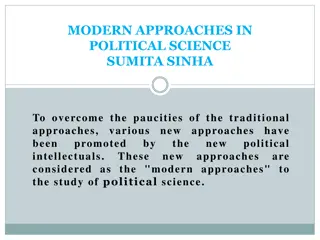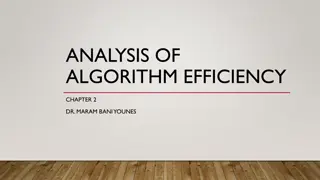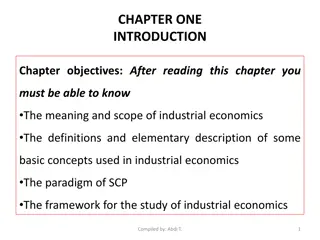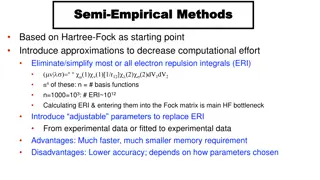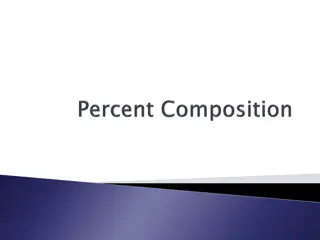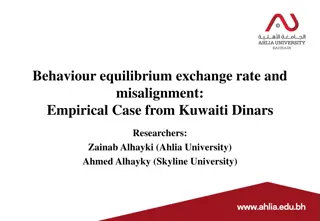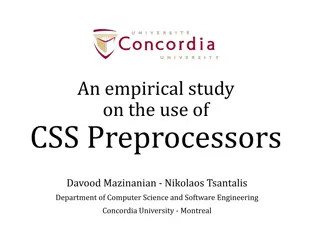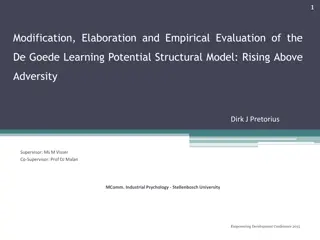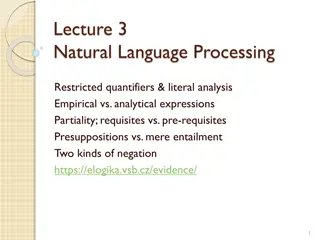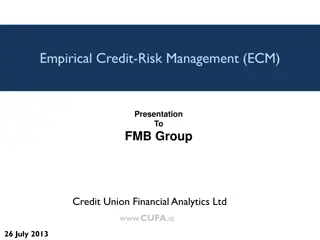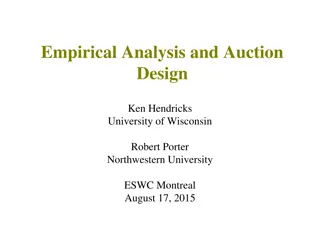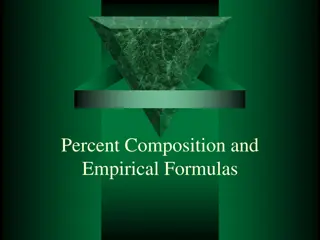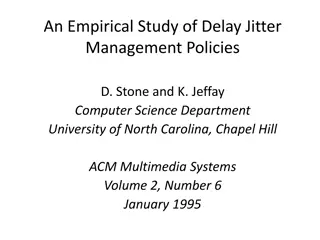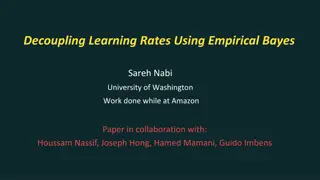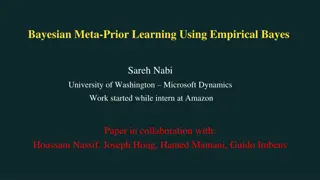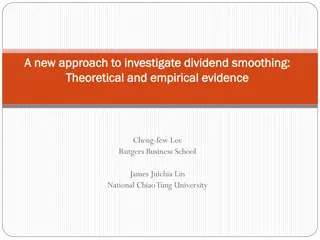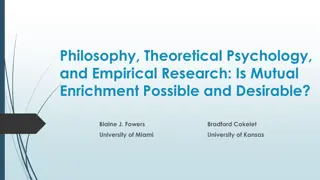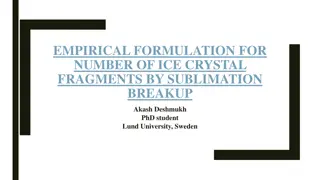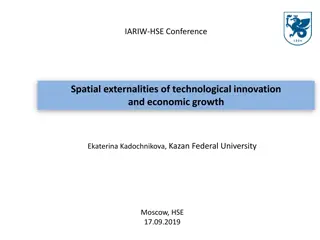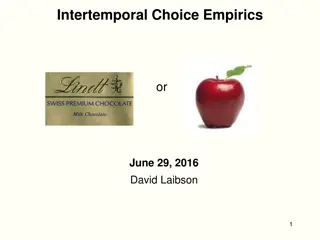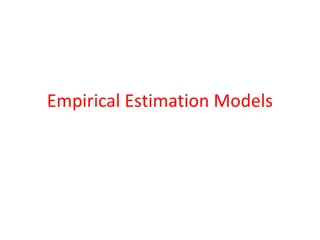FinTech Innovation, Stability, and Efficiency
FinTech innovation influences the stability and efficiency of the traditional banking sector in Malaysia. It provides empirical evidence and covers different types of banks in Malaysia, including commercial and Islamic banks.
14 views • 33 slides
Prior Exposure to Antiretroviral Therapy in Adult HIV Patients in Sub-Saharan Africa
A systematic review was conducted to assess the proportion of adult HIV patients in sub-Saharan Africa with prior antiretroviral therapy experience, specifically focusing on non-naive re-initiators. The study highlighted the challenges faced by these individuals and the need for tailored interventio
0 views • 11 slides
Non Coronary Vascular Stents
Safe scanning of patients with non-coronary vascular stents (NCVS) in MRI settings in NHS Scotland. It covers key questions regarding the safety of patients with NCVS, including risks associated with MRI at different strengths, timing of MRI post-stent implantation, and the safety of various stent m
1 views • 9 slides
Concentration Control in Economics and Industrial Policy
Explore the topic of concentration control in economics and industrial policy, covering recent developments, horizontal and non-horizontal mergers, market power of digital platforms, post-merger evaluations, and calls for stricter merger regulations. Empirical evidence indicates a rise in market con
1 views • 75 slides
Insights into 5G NSA Deployment and Performance in Rome
Explore the transition from 4G to 5G, specifically focusing on the deployment and performance of 5G Non-Standalone (NSA) networks in Rome, Italy. Detailed analysis includes coverage, application performance, and empirical data from large-scale measurement campaigns conducted by four Mobile Network O
2 views • 29 slides
Critique of Causal Metaphysics and Empiricism
In this content, the author critiques the metaphysics of causation from an empiricist perspective, exploring the limitations of empiricism in understanding the contingent truths of the world. It discusses causal antifundamentalism, various forms of skepticism, including Humean skepticism, and challe
4 views • 55 slides
Overview of Research Process and Quantitative Research Phases
The research process involves steps like identifying, locating, assessing, and analyzing the research question to find answers. It includes quantitative and qualitative approaches, with specific phases like conceptual, design, empirical, analytic, and disseminating phases in quantitative research. E
9 views • 27 slides
Understanding Bayesian Model Comparison in Neuroimaging Research
Exploring the process of testing hypotheses using Statistical Parametric Mapping (SPM) and Dynamic Causal Modeling (DCM) in neuroimaging research. The journey from hypothesis formulation to Bayesian model comparison, emphasizing the importance of structured steps and empirical science for successful
4 views • 36 slides
Procedure for Quantifying Interlaminar Damage in Refractory Composites Using Micro-X-Ray CT
This study presents a method to quantify interlaminar damage in refractory composites through in-situ micro-X-ray computed tomography. The procedure aims to capture the progressive failure in ASTM-sized specimens, providing empirical data for improving simulations of composite materials. Various spe
6 views • 19 slides
Pascal's Rule in NMR Spectroscopy ( n+1 )
Pascal's Rule in NMR spectroscopy, also known as the (N+1) rule, is an empirical rule used to predict the multiplicity and splitting pattern of peaks in 1H and 13C NMR spectra. It states that if a nucleus is coupled to N number of equivalent nuclei, the multiplicity of the peak is N+1. The rule help
1 views • 30 slides
Elemental analysis & Structure Elucidation
Understanding elemental analysis and structure elucidation is crucial in chemistry. Learn the process, calculations, and methods involved, such as mass spectrometry, infrared spectroscopy, and nuclear magnetic spectroscopy. Discover how to determine empirical and molecular formulas using examples li
1 views • 27 slides
Understanding Social Science Research for Non-Social Scientists at University of Bath
This resource delves into social science research fundamentals, encompassing types of inquiry, empirical research categories, primary and secondary research distinctions, and the importance of selecting a suitable research topic. It offers guidance on initiating research based on empirical observati
1 views • 10 slides
Understanding Research Hypothesis and Variables in Academic Studies
Research hypothesis plays a crucial role in academic research by providing a probable solution to a research problem. It establishes relationships between different variables, which are empirical properties that can vary. Variables can be independent, dependent, confounding, or intervening, influenc
0 views • 15 slides
Evaluation of Dublin's Warmth and Wellbeing Scheme: Impact on Health and Energy Efficiency
The evaluation study conducted by the London School of Hygiene & Tropical Medicine focused on Dublin's Warmth and Wellbeing pilot scheme, aimed at improving health outcomes and social inclusion through home energy efficiency. Funded by the Government of Ireland, the scheme targeted older individuals
0 views • 9 slides
Modern Approaches in Political Science: Overview and Characteristics
Explore modern approaches in political science pioneered by intellectuals to address the limitations of traditional methods. These approaches emphasize empirical data, interdisciplinary study, and scientific methods to draw conclusions beyond political structures and historical analysis. Key modern
1 views • 13 slides
Understanding Algorithm Efficiency Analysis
In this chapter, Dr. Maram Bani Younes delves into the analysis of algorithm efficiency, focusing on aspects such as order of growth, best case scenarios, and empirical analysis of time efficiency. The dimensions of generality, simplicity, time efficiency, and space efficiency are explored, with a d
1 views • 28 slides
Overview of Industrial Economics: Scope, Evolution, and Challenges
Industrial economics delves into economic issues of firms and industries, exploring their interactions with society. This chapter discusses the meaning and scope of industrial economics, its historical evolution from classical to contemporary theories, traditional concerns like firm performance and
0 views • 71 slides
Overview of Semi-Empirical Methods Based on Hartree-Fock
Semi-empirical methods derived from Hartree-Fock theory aim to reduce computational effort by approximating or eliminating electron repulsion integrals. Strategies include introducing adjustable parameters to replace ERI calculations and utilizing zero differential overlap methods like CNDO, INDO, N
1 views • 11 slides
Parallel Implementation of Multivariate Empirical Mode Decomposition on GPU
Empirical Mode Decomposition (EMD) is a signal processing technique used for separating different oscillation modes in a time series signal. This paper explores the parallel implementation of Multivariate Empirical Mode Decomposition (MEMD) on GPU, discussing numerical steps, implementation details,
1 views • 15 slides
Understanding Percent Composition and Empirical Formulas in Chemistry
The Law of Definite Proportions governs the composition of compounds based on molar masses, allowing us to calculate percentage compositions of elements within a compound. Through examples involving various compounds like Fe3C, sulfur dioxide, ammonium nitrate, glucose, and acetic acid, we explore t
3 views • 7 slides
Empirical Research on Surrogacy in New Zealand: Key Findings
Associate Professor Debra Wilson from the University of Canterbury in New Zealand conducted empirical research on public opinions regarding surrogacy. The findings revealed three surprising results, including perspectives on surrogates being compensated, the importance of genetics in surrogacy arran
0 views • 11 slides
Generalization of Empirical Risk Minimization in Stochastic Convex Optimization by Vitaly Feldman
This study delves into the generalization of Empirical Risk Minimization (ERM) in stochastic convex optimization, focusing on minimizing true objective functions while considering generalization errors. It explores the application of ERM in machine learning and statistics, particularly in supervised
0 views • 11 slides
Empirical Analysis of Kuwaiti Dinar Exchange Rate Behavior and Misalignment
This research focuses on studying the behavior of the real equilibrium exchange rate (REER) of Kuwaiti Dinars, estimating the equilibrium exchange rate using the BEER model, and calculating real exchange misalignments (RERM). It delves into the impact of exchange rate fluctuations on macroeconomic v
0 views • 15 slides
History of Chemotherapy: From Empirical Use to Modern Era
The history of chemotherapy is divided into three phases, starting from the empirical use of compounds in ancient times to the modern era marked by targeted drug development. Ehrlich's pioneering work in the late 19th to early 20th centuries laid the foundation for understanding the selective toxici
0 views • 15 slides
Empirical Study on CSS Preprocessors: Insights and Findings
Exploring the utilization of CSS preprocessors in web development through an empirical study conducted by Davood Mazinanian and Nikolaos Tsantalis from Concordia University. The study delves into the motivations behind using CSS preprocessors, developers' preferences, features offered by preprocesso
0 views • 24 slides
Empirical Evaluation of De Goede Learning Potential Model
This research paper focuses on the modification and extension of the De Goede Learning Potential Structural Model, aiming to identify non-cognitive variables influencing learning potential. Through model development, hypothesis testing, and empirical evaluation, the study explores factors such as In
0 views • 12 slides
Understanding Empirical vs Analytical Expressions in Natural Language Processing
Restricted quantifiers and literal analysis in natural language processing reveal the distinctions between empirical and analytical expressions. While empirical expressions refer to non-trivial intensions that require empirical investigation, analytical expressions denote constant intensions that ca
1 views • 19 slides
Empirical Credit Risk Management at FMB Group Credit Union
Empirical Credit-Risk Management (ECM) presentation to FMB Group Credit Union by Financial Analytics Ltd discusses the background, traditional forecasting methods, income and risk recognition, provisioning approaches, and benefits for credit unions. ECM offers expert retail credit risk management th
0 views • 25 slides
Impact of ZLECAf in North Africa: Empirical Evaluation
The Economist, Aziz Jaid, from the CEA Bureau for North Africa conducted an empirical evaluation on the impact of the ZLECAf in North Africa, focusing on goods. The context includes coverage of seven countries, the rationale behind the ZLECAf agreement, and details on the liberalization scenarios an
0 views • 13 slides
Understanding Auction Design: Empirical Analysis and Practical Insights
Auctions play a crucial role in various sectors due to their efficiency in price discovery and resource allocation. This article delves into auction design issues, the role of structural analysis, and the transformative Laffont program. Discover the importance of empirical analysis in optimizing auc
0 views • 59 slides
Understanding Percent Composition and Empirical Formulas
Explore the concept of percent composition, empirical formulas, and how to determine them through examples. Learn how to convert percentages to grams, calculate moles, and find the simplest ratio among elements in a compound.
0 views • 9 slides
An Empirical Study of Delay Jitter Management Policies
This study explores delay jitter management policies to support interactive audio over LANs, focusing on display queue management to minimize gaps in playout. The paper evaluates different queue management policies, including I-policy and E-policy, along with queue monitoring in the context of an em
0 views • 37 slides
Decoupling Learning Rates Using Empirical Bayes: Optimization Strategy
Decoupling learning rates through an Empirical Bayes approach to optimize model convergence: prioritizing first-order features over second-order features improves convergence speed and efficiency. A detailed study on the impact of observation rates on different feature orders and the benefits of seq
0 views • 25 slides
Bayesian Meta-Prior Learning Using Empirical Bayes: A Framework for Sequential Decision Making Under Uncertainty
Explore the innovative framework proposed by Sareh Nabi at the University of Washington for Bayesian meta-prior learning using empirical Bayes. The framework aims to optimize ad layout and classification problems efficiently by decoupling learning rates of model parameters. Learn about the Multi-Arm
0 views • 27 slides
Investigating Dividend Smoothing: Theoretical & Empirical Analysis
Dividend smoothing behavior in corporate finance is investigated through the partial adjustment and information content hypotheses. A new integrated model is proposed to evaluate dividend smoothing behaviors, contributing to a deeper understanding of firm tendencies to smooth dividends. Empirical ev
0 views • 21 slides
The Interplay Between Theoretical Psychology and Empirical Research
Exploring the potential for collaboration between philosophy, theoretical psychology, and empirical research, this article delves into the historical divide, recent renaissance, and avenues for mutual enrichment. It raises questions about how each discipline can contribute to and benefit from the ot
0 views • 16 slides
Empirical Formulation for Ice Crystal Fragmentation by Sublimation Breakup Study
This study by Akash Deshmukh at Lund University delves into the empirical formulation for the number of ice crystal fragments resulting from sublimation breakup. It discusses secondary ice production mechanisms, challenges in numerical formulation, observational bases, previous studies, and cloud de
0 views • 7 slides
Spatial Externalities of Technological Innovation and Economic Growth: Empirical Study
This study explores the spatial externalities of technological innovation and economic growth, focusing on the convergence of growth rates in different regions. It delves into the impact of knowledge capital, patents, human capital, and internet development on regional growth rates. Various theories
0 views • 26 slides
Empirical Studies on Intertemporal Choice by David Laibson
This collection of empirical studies explores intertemporal choice behavior, focusing on preference reversals, commitment, and other related concepts. The studies reveal how individuals exhibit time-inconsistent preferences when making decisions about future and present outcomes, showcasing examples
0 views • 49 slides
Estimation Models in Software Development
Empirical Estimation Models like COCOMO and Constructive Cost Model play a crucial role in estimating software project efforts based on various factors such as lines of code (LOC) and function points (FP). These models provide a structured approach to predict project duration, effort, and team size.
0 views • 14 slides



